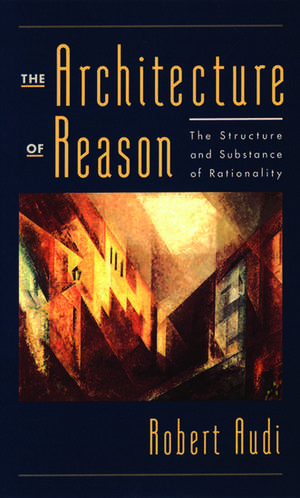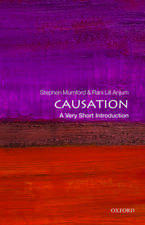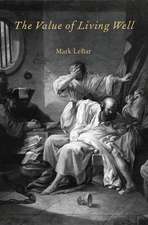The Architecture of Reason: The Structure and Substance of Rationality
Autor Robert Audien Limba Engleză Hardback – 19 apr 2001
| Toate formatele și edițiile | Preț | Express |
|---|---|---|
| Paperback (1) | 296.22 lei 31-37 zile | |
| Oxford University Press – 7 noi 2002 | 296.22 lei 31-37 zile | |
| Hardback (1) | 863.18 lei 31-37 zile | |
| Oxford University Press – 19 apr 2001 | 863.18 lei 31-37 zile |
Preț: 863.18 lei
Preț vechi: 1241.12 lei
-30% Nou
Puncte Express: 1295
Preț estimativ în valută:
165.16€ • 172.46$ • 136.39£
165.16€ • 172.46$ • 136.39£
Carte tipărită la comandă
Livrare economică 04-10 aprilie
Preluare comenzi: 021 569.72.76
Specificații
ISBN-13: 9780195141122
ISBN-10: 0195141121
Pagini: 304
Dimensiuni: 229 x 152 x 21 mm
Greutate: 0.62 kg
Editura: Oxford University Press
Colecția OUP USA
Locul publicării:New York, United States
ISBN-10: 0195141121
Pagini: 304
Dimensiuni: 229 x 152 x 21 mm
Greutate: 0.62 kg
Editura: Oxford University Press
Colecția OUP USA
Locul publicării:New York, United States
Recenzii
Architectureis a rich and illuminating work of philosophy. Much of its richness lies in the connections Audi draws among the topics he discusses. He spends a good deal of time developing subtle analogies between the practical and theoretical realms, and is perceptive throughout about the extent to which questions of justification and of explanation are interwoven in our thought about reason and rationality. Anyone writing in any of the myriad fields touched upon by Architecture will profit from its depth of thought and breadth of perspective.
The Architecture of Reason systematically tackles a fundamental, pervasive philosophical issue in lucid prose, and it makes a powerful case for an extremely attractive unity where one may expect fragmentation ... This ground-breaking book is in a class of its own.
Audi provides detailed, instructive accounts of desire and belief ... a plausible, insightful account of reasons for belief and for action; a subtle, illuminating treatment of altruism and its significance for ethics; an extremely useful charting and critical examination of various kinds of relativism; and a judicious, fruitful discussion of moral motivation and the normative force of moral reasons.
Audi has articulated a general, comprehensive theory of rationality ... a remarkably ambitious project ... but Audi is up to the task.
The strength of the book is that it places the significance of issues in ways that indicate the most important connections between them and the ways in which they figure in an overall conception of rationality and rational justification. Readers can both learn a great deal about the contours of the main debates concerning these issues and also find in the book a systematic theory of rationality that is important and interesting in its own right.
The book has a particular strength in respect of its overall conception and another in respect of execution. The former is that it brings vividly to light some quite substantial points of contact and analogy between the projects of understanding and explicating theoretical reason on the one hand and practical reason on the other ... The latter strength is that there is an admirable clarity of presentation.
The Architecture of Reason systematically tackles a fundamental, pervasive philosophical issue in lucid prose, and it makes a powerful case for an extremely attractive unity where one may expect fragmentation ... This ground-breaking book is in a class of its own.
Audi provides detailed, instructive accounts of desire and belief ... a plausible, insightful account of reasons for belief and for action; a subtle, illuminating treatment of altruism and its significance for ethics; an extremely useful charting and critical examination of various kinds of relativism; and a judicious, fruitful discussion of moral motivation and the normative force of moral reasons.
Audi has articulated a general, comprehensive theory of rationality ... a remarkably ambitious project ... but Audi is up to the task.
The strength of the book is that it places the significance of issues in ways that indicate the most important connections between them and the ways in which they figure in an overall conception of rationality and rational justification. Readers can both learn a great deal about the contours of the main debates concerning these issues and also find in the book a systematic theory of rationality that is important and interesting in its own right.
The book has a particular strength in respect of its overall conception and another in respect of execution. The former is that it brings vividly to light some quite substantial points of contact and analogy between the projects of understanding and explicating theoretical reason on the one hand and practical reason on the other ... The latter strength is that there is an admirable clarity of presentation.
Notă biografică
Robert Audi is Charles J. Mach Distinguished Professor of Philosophy, University of Nebraska, Lincoln. His books include The Structure of Justification (1993), Action, Intention, and Reason (1993), Moral Knowledge and Ethical Character (Oxford, 1997) and The Cambridge Dictionary of Philosophy (2nd Ed., 1999).














